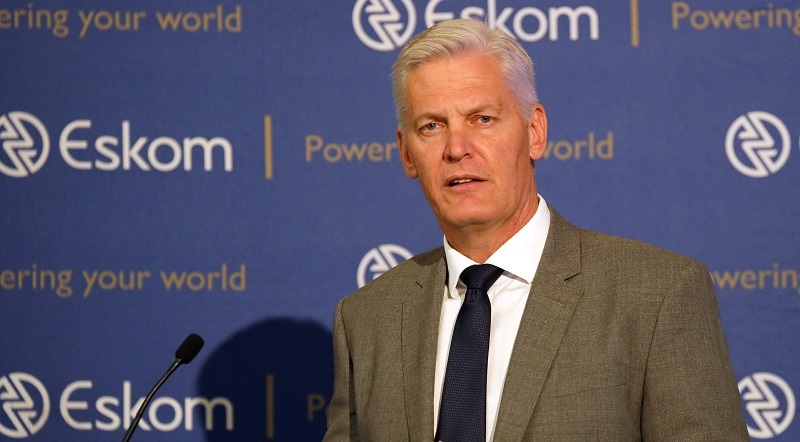The Eskom boss said that a “senior government minister” said it was “pragmatic” to water down corruption safeguards in a $8.5bn international clean energy deal
The South African government tried to “water down governance” around how $8.5 billion of clean energy funding will be spent, the outgoing CEO of state-owned energy firm Eskom has claimed.
In an 50-minute televised interview, Andre De Ruyter claimed the company he led for three years had been infiltrated by violent organised criminals and that it is riddled with corruption to which the police, state security services, local politicians and central government turned a blind eye.
The ruling African National Congress party responded by calling De Ruyter a “naysayer” with a “rightwing ideological posture” and said his claims about corruption were “unfortunate, irresponsible, and baseless”.
At Cop26 in 2021, the South African government announced it would receive $8.5 billion of loans and grants from rich nations to fund projects like renewable power, electricity transmission lines, electric vehicle production and green hydrogen.
Much of this money will be spent by Eskom and De Ruyter said the deal was done “by and large at Eskom’s intervention”. The agreement, known as a just energy transition partnership (JETP), formed a model for similar deals with Indonesia and Vietnam.
Corruption crusader
Since taking over Eskom in 2019, De Ruyter said he had tried to root out corruption and to start shifting South Africa’s energy system from coal to clean energy. But he said he has been opposed by criminal cartels and by sections of the government and his coffee was poisoned with cyanide in December.
Asked if Eskom was a “feeding trough” for South Africa’s governing party, De Ruyter replied: “I would say the evidence suggests that it is. I expressed my concern to a senior government minister about attempts, in my view, to water down governance around the [JETP] and the response was essentially, you know, you have to be pragmatic. In order to pursue the greater good, you have to enable some people to eat a little bit”.
De Ruyter did not say if attempts to weaken governance had been succesful. A spokesperson for Germany’s ministry for economic co-operation and development (BMZ) told Climate Home it was “aware of current issues at and around Eskom and in South Africa’s coal sector”.
The spokesperson added that donor countries promising to mobilise the $8.5bn “will jointly work with the government of South Africa to ensure that governance arrangements are in place for any funds that support the Just Energy Transition Partnership” and that every lender “will need to do due diligence around any proposed spending”.
These rich nations will have to “understand” Eskom’s and the South African government’s plans, the spokeperson said. “The continued fight of the government against corruption and crime in the energy sector is essential and also an important pre-condition to reduce the current huge level of load shedding.”
High scrutiny
Saliem Fakir, a South African who heads the Africa Climate Foundation told Climate Home that De Ruyter’s concern was “not far fetched” and that zero tolerance on corruption was necessary to make the energy transition just.
But, he said that investments made under the JETP were likely to be closely scrutinised because it is a high-profile initiative, it is climate finance and because the funds come from abroad.
In December 2022, South Africa’s energy minister Gwede Mantashe accused De Ruyter of “actively agitating for the overthrow of the state” by forcing planned power cuts, known as “load shedding”, on South Africans. Eskom had taken these measures since before De Ruyter became chief in December 2019, as South Africa’s electricity demand often outstrips supply.
After receiving no defence from prime minister Cyril Ramaphosa, De Ruyter handed in his resignation five days later. That same day, before news of his resignation was made public, his personalised coffee mug was poisoned with a mixture of cyanide and rat poison at Eskom’s headquarters. He said this was likely to be a response to his efforts to tackle corruption, sabotage and organised crime.
Criminal cartels
De Ruyter told ETV last week that one billion rand ($50m) was stolen from Eskom every month. The company is currently 423 bi
Read More

